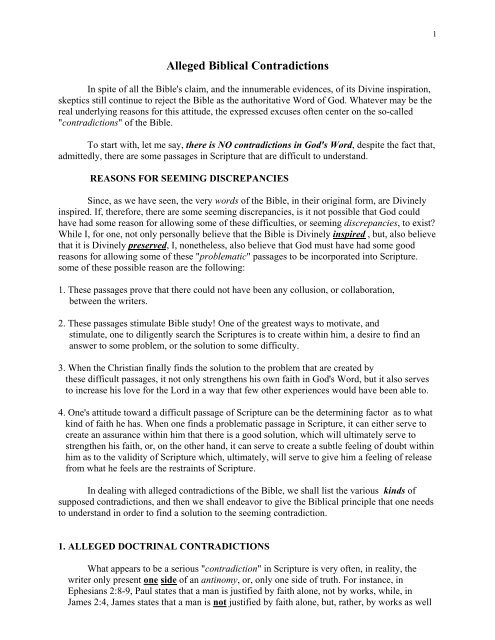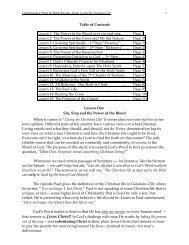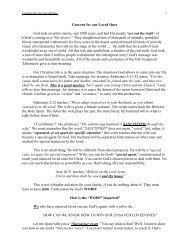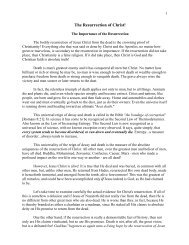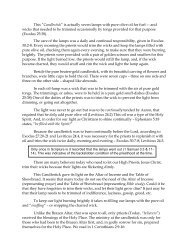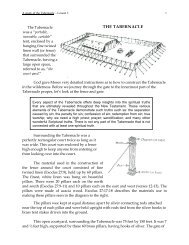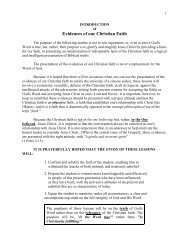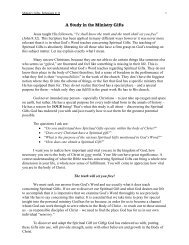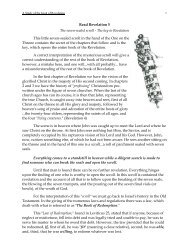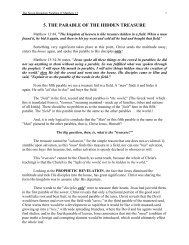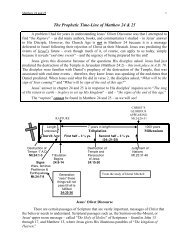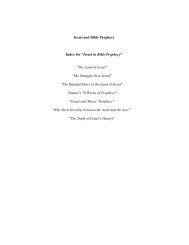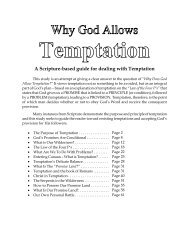ALLEGED BIBLE CONTRADICTIONS - NetBibleStudy.com
ALLEGED BIBLE CONTRADICTIONS - NetBibleStudy.com
ALLEGED BIBLE CONTRADICTIONS - NetBibleStudy.com
Create successful ePaper yourself
Turn your PDF publications into a flip-book with our unique Google optimized e-Paper software.
1<br />
Alleged Biblical Contradictions<br />
In spite of all the Bible's claim, and the innumerable evidences, of its Divine inspiration,<br />
skeptics still continue to reject the Bible as the authoritative Word of God. Whatever may be the<br />
real underlying reasons for this attitude, the expressed excuses often center on the so-called<br />
"contradictions" of the Bible.<br />
To start with, let me say, there is NO contradictions in God's Word, despite the fact that,<br />
admittedly, there are some passages in Scripture that are difficult to understand.<br />
REASONS FOR SEEMING DISCREPANCIES<br />
Since, as we have seen, the very words of the Bible, in their original form, are Divinely<br />
inspired. If, therefore, there are some seeming discrepancies, is it not possible that God could<br />
have had some reason for allowing some of these difficulties, or seeming discrepancies, to exist<br />
While I, for one, not only personally believe that the Bible is Divinely inspired , but, also believe<br />
that it is Divinely preserved, I, nonetheless, also believe that God must have had some good<br />
reasons for allowing some of these "problematic" passages to be incorporated into Scripture.<br />
some of these possible reason are the following:<br />
1. These passages prove that there could not have been any collusion, or collaboration,<br />
between the writers.<br />
2. These passages stimulate Bible study! One of the greatest ways to motivate, and<br />
stimulate, one to diligently search the Scriptures is to create within him, a desire to find an<br />
answer to some problem, or the solution to some difficulty.<br />
3. When the Christian finally finds the solution to the problem that are created by<br />
these difficult passages, it not only strengthens his own faith in God's Word, but it also serves<br />
to increase his love for the Lord in a way that few other experiences would have been able to.<br />
4. One's attitude toward a difficult passage of Scripture can be the determining factor as to what<br />
kind of faith he has. When one finds a problematic passage in Scripture, it can either serve to<br />
create an assurance within him that there is a good solution, which will ultimately serve to<br />
strengthen his faith, or, on the other hand, it can serve to create a subtle feeling of doubt within<br />
him as to the validity of Scripture which, ultimately, will serve to give him a feeling of release<br />
from what he feels are the restraints of Scripture.<br />
In dealing with alleged contradictions of the Bible, we shall list the various kinds of<br />
supposed contradictions, and then we shall endeavor to give the Biblical principle that one needs<br />
to understand in order to find a solution to the seeming contradiction.<br />
1. <strong>ALLEGED</strong> DOCTRINAL <strong>CONTRADICTIONS</strong><br />
What appears to be a serious "contradiction" in Scripture is very often, in reality, the<br />
writer only present one side of an antinomy, or, only one side of truth. For instance, in<br />
Ephesians 2:8-9, Paul states that a man is justified by faith alone, not by works, while, in<br />
James 2:4, James states that a man is not justified by faith alone, but, rather, by works as well
2<br />
as by faith. While these writers appear to be stating opposing truths, in reality, they are stating<br />
different sides of the same truth, because . . .<br />
Truth is two-sided and the balance between the two sides is the<br />
most important aspect to consider when studying God's Word!<br />
Whether one is studying what seems to be two opposing spiritual truths...[for example,<br />
the responsibility of man's will verses the sovereignty of God]...it is important that one<br />
understand that, because God knows man's tendency to cling to one extreme side of truth, He,<br />
therefore, counteracts this tendency of man's human nature by presenting two seemingly<br />
clashing, yet, harmonizing, sides of truth, to, thereby, prevent man from straying from truth in<br />
either of two opposite directions.<br />
Martin Luther said, "Man, in search for truth, is like a drunken peasant! When you try to<br />
help him up on one side of his horse, he will fall over on the other side."<br />
To help understand all the dynamics that are involved in truth,<br />
it might be helpful to envision truth as a road that is hedged in on<br />
both sides. If one should wonder too far to one side, or the other, he is<br />
sure to hit a hedge. Or, to envision truth like a bird who, should<br />
someone destroy one of its two wings, would wonder around in<br />
circles.<br />
Truth is found between two extremes and, because human nature tends to gravitate to<br />
one of the two opposite directions of truth, God provides us, through Scripture, with two sides<br />
of truth, and, it should behoove us not to trample on one side of God's truth in our zeal for the<br />
other!<br />
2. <strong>ALLEGED</strong> ETHICAL <strong>CONTRADICTIONS</strong><br />
Because there are certain practices which God <strong>com</strong>mands us to do under one set of<br />
circumstances, and then forbids us to do under another set of circumstances, there appears to<br />
be a number of ethical contradictions in the Bible. However, once again, there are certain<br />
Biblical principles which, once one has knowledge of them, will help him resolve whatever<br />
conflict he may feel over these seeming "contradictions."<br />
These Bible principles are as follows:<br />
(A) THE PRINCIPLE OF GOD'S HIGHER VIEW<br />
God tells us, "As the heavens are higher than the earth, so are My ways<br />
higher than your ways and My thoughts than your thoughts" [Isaiah 55:9].<br />
Because God's ways are higher than our ways [God cares more about our<br />
eternal state than He does about our earthly one] what we would deem to be<br />
unethical, from our earthly perspective, God views from His eternal perspective<br />
vantage point to be not at all unethical. What appears to be an ethical contradiction<br />
on God's part is not a contradiction at all, but, rather just the reality that God's ways<br />
are different than man's view.
3<br />
For example, because "God sees not as man sees," we have a tendency to<br />
question how God could say of David, who was not only guilty of adultery, but also<br />
murder, "he is a man after My own heart." The answer to this question is due to the<br />
fact that, "man looks at the outward appearance, but God looks at the heart." God<br />
could see David's heart was truly repentant, that, in spite of his sin, he had a sincere<br />
desire to life for Him. Despite the fact that David still had to suffer the consequences<br />
of his sin [Psalm 32:5] God forgave him and viewed him as a man after His own<br />
heart. Even though David sinned, his heart was fundamentally right toward God and<br />
he was a repentant and humble man, the kind of person who truly reaches the heart of<br />
God.<br />
(B) THE PRINCIPLE OF AN EXHAUSTIVE STUDY OF THE CONTEXT<br />
When one finds two statements in Scripture which appear to be<br />
contradictory, one must weigh every word within the context of which it was spoken<br />
if he hopes to understand what it is that God is saying. For example, in Exodus 20:13,<br />
God says, "Thou shalt not kill" [The Hebrew word used here means "murder"] and,<br />
yet, in Genesis 9:6, God says, "Whoso sheds man's blood, by man shall his blood be<br />
shed; for in the image of God He made man." [With this state- ment, which God<br />
made to Noah when He was making His covenant with him, God instituted the law of<br />
Capital Punishment.] How can we account for the seeming contradiction of these<br />
two statements The answer is, simply, that when God said, "Thou shalt not kill," He<br />
was saying that one man does not have the right to take the life of another because,<br />
when one man takes the initiative to kill another, it is "murder!" So, when God says,<br />
"Thou shalt not kill," what He is really saying is "Thou shalt not murder." However,<br />
on the other hand, when God says, "Whoso sheds man's blood, by man shall his blood<br />
be shed," He is saying that government, [which, immediately after the flood He<br />
<strong>com</strong>manded man to establish to represent Him in maintaining order and righteousness<br />
in human societies], does have the right, and authority, to take the life of another<br />
if that's what it takes to maintain law and order. Therefore, a soldier, who goes to war<br />
under government orders, because he represents governmental authority in carrying<br />
out this responsibility, is not guilt of <strong>com</strong>mitting "murder" when he kills another.<br />
(C) THE PRINCIPLE OF DRASTIC MEASURES<br />
Although we have already covered the subject of what seems to be God's<br />
severity, we mention it again simply because an understanding of the concepts that<br />
were covered on this subject, in a previous lesson, are pertinent to a study on<br />
seemingly Biblical contradictions, because, God's seeming "cruelty" appears to be a<br />
contradiction to the Biblical statement that "God is a "loving God!"<br />
In order to reconcile this seeming contradictions, we remind you, again, that it<br />
was the exceeding wickedness of sin, and the depth of depravity that certain<br />
civilizations had fallen into, that made it necessary for God to take such extreme,<br />
drastic, measures . . . [Like the destruction of the Canaanites, Sodom and Gomorrah,<br />
or, even Ananias and Sapphira in the New Testament] . . . to stop the spread of their<br />
wickedness, and evil, to others. So, what appears to be an act of "cruelty" on God's<br />
part is, really an act of "love" . . . a love that desires that others not be polluted by
4<br />
evil, a love that chooses the "lesser evil," in this case, the destruction of the<br />
unrighteous for the sake of the righteous.<br />
And, it is the same Biblical principle that is the answer to people's<br />
question as to why God, on one hand, makes it clear that Christians must always have<br />
"spirit of love and forgiveness" toward all men and, yet, on the other hand, instructs<br />
those same Christians to "ex<strong>com</strong>municate, reject" certain ones from the Church<br />
[Titus 3:10], or, even to "deliver such a one to Satan for the destruction of the flesh"<br />
[1 Corinthians 5:5 and 1 Timothy 1:20]. The answer to this seeming contradiction is<br />
that, like Jesus, Who, though He never defended His own personal rights, defended<br />
His Father's Kingdom, we, too, are not to "defend," or retaliate, when someone<br />
affronts, or threatens, our own personal rights, but we are to defend the Kingdom of<br />
God if anyone is hurting His kingdom, or the work of the Church, and we are to take<br />
a stand against that evil even if, in doing so, we have to take what seems to be a<br />
"harsh" action, or, resorting to "drastic measures."<br />
(D) THE PRINCIPLE OF AUTHENTIC FACTS<br />
In a study of seemingly Biblical contradictions, it is important to make note of<br />
the fact that God often uses Scripture to record the facts as they actually happened,<br />
however, just because God records what actually took place, does not mean that He<br />
approves of what happened. The assumption that many people make is that, because<br />
an event is recorded in Scripture, God approves of it. And this assumption makes<br />
God appear to be contradictory.<br />
An example of God recording an incident of which He did not necessarily<br />
approve of, because He was simply presenting the authentic facts of the story, is<br />
Jephthah's vow in Judges 11:30-3.<br />
(E) THE PRINCIPLE OF UNDERSTANDING HEBREW AND GREEK WORDS<br />
Many alleged contradictions arise simply because one, being unfamiliar with<br />
the peculiarities of the Hebrew, or Greek, language, inadequately translate a word, or<br />
the meaning of a word, which causes him to misunderstand what is being said.<br />
A good example of a seeming contradiction that is a result of this kind of<br />
misunderstanding is found in the first and second chapters of Genesis. The first<br />
chapter of Genesis makes it quite plain that God created the animals before He<br />
created Adam. Yet, the second chapter of Genesis states, "Out of the ground the Lord<br />
God formed every beast of the field, and every fowl of the air, and brought them unto<br />
Adam to see what he would call them," which makes it appear that God created the<br />
animals after He created Adam.<br />
This seeming problem arises from an inadequate translation of the original<br />
Hebrew word in Genesis 2:19. The word is translated as "formed," however, the very<br />
same Hebrew word also has the meaning of, "had formed." [The same Hebrew word<br />
for both "formed," and "had formed," are one and the same.] This being true, the<br />
translators could just as well have translated Genesis 2:19 as , "the Lord HAD formed<br />
every beast of the filed," thus, eliminating any contradiction.
5<br />
Another Scriptural passage which has been misunderstood because of a lack<br />
of understanding of the peculiarities of the Hebrew language is Exodus 9:12, which<br />
states, "The Lord hardened the heart of Pharaoh." Before one can under- stand what<br />
this passage is really saying, he need to have knowledge of the fact that, in the<br />
Hebrew culture, whenever someone, in any way, permitted something . . . permitted<br />
any action to take place . . . it was said that he was responsible for that thing having<br />
been done. Since this was the Hebrew culture's way of expressing itself, what Exodus<br />
9:12 is really saying, is that God simply permitted Pharaoh's heart to be hardened.<br />
The Biblical context will show that it was Pharaoh's own choice, his constant choice<br />
of resisting God every time that God gave him the occasion to do so, that caused him<br />
to harden his own heart.<br />
In the same way, the presentation of the Gospel affords one the opportunity to<br />
either harden, or soften, his heart, to its message. If he accepts, and "receives,"<br />
the Gospel message, his heart is softened and he is, consequently, saved and<br />
made alive. On the other hand, if he rejects, and resists, the Gospel message, his<br />
heart is hardened and he is consequently, damned, and "lost."<br />
[See Romans 2:4-11 and 2 Corinthians 2:15-16]<br />
Just as the sun either hardens clay, or softens wax, God's truths, His actions, either<br />
break the self-nature, subdue the self-life of an individual, or they, ultimately, only serve<br />
to harden his heart, and, just as the "determining factor" of whether the sun will either<br />
cause a material to harden or soften, lies in the material itself, and not in the sun. So, too,<br />
the "determining factor" of whether or not God's truths, or actions, "causes" an<br />
individual's heart to harden of soften, lies in the individual himself, rather than in God.<br />
Whenever anyone studies a language, [such as French, German, Greek, Latin, or<br />
any language], he learns that there are some words in one language that does not have<br />
any exact equivalent in other languages. This, of course, means that there is no such thing<br />
as a "word-for-word" translation from one language to another. Therefore, a word-forword<br />
translation is impossible, not only because of the lack of word-equivalents between<br />
languages, but, also, because words, in every language, carry cultural connotations<br />
which, apart from the narrative discourse ac<strong>com</strong>panying the text, cannot be translated<br />
with any degree of absolute accuracy! Add to all this, the fact that individual words can<br />
have numerous meanings.<br />
For example, the English word "fast," when used as an adjective, has different<br />
meanings, depending on the word it is defining; a "fast" shut door is a door that is<br />
closed tightly; a "fast" friend is a person who is especially close to someone; a "fast"<br />
plane is one that travels at a high speed; a "fast" dye is a dye that doesn't fade, etc,<br />
etc.<br />
In the same way, we are told that the English word "run" has at least ninety-two<br />
[that's 92!] meanings in the English language!<br />
It is also true that, like English words, Greek words can have a number of different<br />
meanings: For example the Greek word "katergadzomai" can mean "to achieve," "to create," "to<br />
prepare," or "to overpower," which means that each time a translator is faced with translating
6<br />
this Greek word into English, he is also faced with having to choose one of several alternative<br />
meanings. Once he makes that choice, he departs from the idea of "mechanical" translation and<br />
moves into the realm of "interpretation."<br />
Another problem that the translator is faced with is the fact that, because the<br />
construction, and word order, of the Greek language is different from that of the English<br />
language, a literal translation of the Greek, as it is constructed in the Greek, would render an<br />
unreadable translation in English.<br />
For example, a literal translation of Galatians 2:20 would read,<br />
"Christ I have been crucified with, I live yet, no longer I live, but<br />
in me Christ," which, as one can tell, is a very difficult to<br />
understand.<br />
Despite the fact that a good translation endeavors to carry over, into the English<br />
language, the emphasis of meaning that exists in the Greek language, one must keep in mind that<br />
there is no way to avoid the fact that any translation is, in its own way, also a concise<br />
<strong>com</strong>mentary.<br />
There is a certain tension between a translator's desire to translate a Scriptural passage in<br />
such a way as to make it understandable to the reader and his desire to, at the same time,<br />
translate it in such a way as to make the reader aware that, because he is handling a piece of<br />
ancient literature, the real meaning of the passage must be understood in its ancient setting.<br />
For example, one translation translates the phrase, "Greet one another with a holy kiss" as<br />
"shake hands all around," and, this translation does seem to make good sense in our<br />
contemporary churches today, nevertheless, it does eliminate the meaning of an important<br />
liturgical expression of Christian love which prevailed in the first centuries of Christendom.<br />
Because great benefit has <strong>com</strong>e to us from the various English translations of the Bible, I,<br />
for one, thank God for them! However, one should keep in mind that, because there are<br />
problems of translation, before he accepts some particular wording of Scripture as expressing the<br />
absolute truth that is intended, he should check out the particular wording [particular translation]<br />
in a good <strong>com</strong>mentary based on the original Greek or Hebrew text! One must also keep in mind<br />
that, in order to safeguard what God was really saying through the prophets and apostles, he must<br />
approach the Bible in its original historical, and grammatical, setting!<br />
There are, of course, other seeming Biblical discrepancies, or "contradictions," that have<br />
not been cited in this study. However, if one accepts, as fact, the plenary inspiration of the Bible,<br />
he can have the assurance that, as this study has endeavored to illustrate, with careful, study, the<br />
solutions to these seeming discrepancies can be found.


